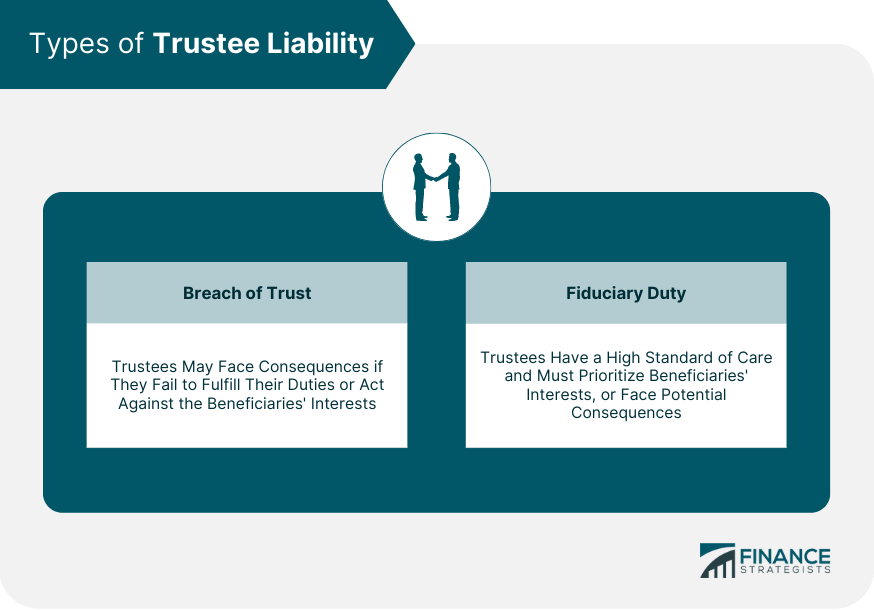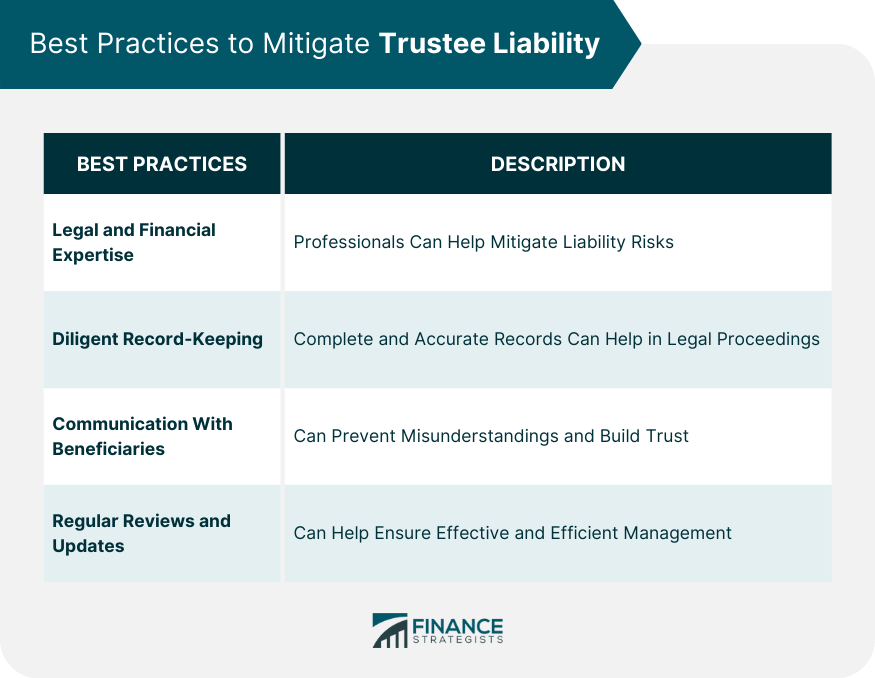Trustee liability refers to the legal responsibility and potential consequences that trustees may face if they fail to fulfill their duties and responsibilities or act in a manner that harms the trust or its beneficiaries. Trustees can be held liable for their actions or omissions, and may be required to compensate the trust and its beneficiaries for any losses or damages caused. Trustee liability is of significant importance as it helps ensure accountability and protection for the beneficiaries and the trust's assets. By holding trustees accountable for their actions, it promotes responsible trust management and discourages negligence or misconduct. A breach of trust occurs when a trustee fails to fulfill their fiduciary duties, breaches the terms of the trust, or acts in a manner that is contrary to the best interests of the beneficiaries. This can include mismanagement of trust assets, improper distributions, conflicts of interest, or failure to provide required information to the beneficiaries. A breach of trust can result in civil liability for the trustee, where they may be required to compensate the trust and its beneficiaries for any losses suffered as a result of their actions. The specific consequences of a breach of trust may vary depending on the severity and impact of the breach. Trustees owe a fiduciary duty to the beneficiaries, which is the highest standard of care and loyalty. Fiduciary duty encompasses various obligations, including acting in the best interests of the beneficiaries, avoiding conflicts of interest, and exercising diligence and skill in managing the trust's affairs. A breach of fiduciary duty can result in trustee liability. Trustees must always prioritize the beneficiaries' interests over their own and act in accordance with the trust's terms and applicable laws. Failure to meet the fiduciary duty can lead to legal consequences and potential financial liability for the trustee. Civil liability is a legal consequence that trustees may face for breaching their duties and responsibilities. Civil liability can result in monetary damages, where the trustee may be required to compensate the trust and its beneficiaries for any losses suffered as a result of their actions or negligence. Civil lawsuits can be initiated by the trust or beneficiaries seeking redress for the harm caused by the trustee's breach of duty. The specific legal remedies and the extent of liability will depend on the jurisdiction and the nature of the breach. In some cases, trustee misconduct can rise to the level of criminal activity, resulting in criminal liability. Criminal liability may be applicable if the trustee engages in fraudulent activities, embezzlement, or other illegal actions that go beyond mere negligence or breaches of duty. Criminal charges can lead to severe consequences, including fines, imprisonment, and a tarnished reputation. The potential for criminal liability underscores the seriousness of trustee responsibilities and the need for trustees to act with integrity and within the bounds of the law. Different types of trusts, such as revocable trusts, irrevocable trusts, charitable trusts, or discretionary trusts, have varying legal requirements and standards of trustee conduct. Trustees must familiarize themselves with the specific provisions and obligations of the trust they are managing to ensure they meet the applicable legal standards and mitigate potential liability. The trust instrument may establish specific guidelines, restrictions, or provisions that trustees must follow, and failure to do so can result in breach of trust and legal liability. Trustees must review and understand the trust instrument thoroughly, seek legal advice when necessary, and act within the scope of their authority as outlined in the trust instrument. Any amendments or modifications to the trust instrument must be made in accordance with applicable legal requirements and the terms of the trust. Trustees must exercise reasonable care, diligence, and skill when managing the trust's assets and making decisions that affect the beneficiaries' interests. Failure to do so can result in breach of duty and legal consequences. Trustees must document their actions and decisions carefully, keep accurate records, and seek expert advice when necessary to mitigate potential liability. Trustees must have the legal and financial expertise necessary to manage the trust properly. If a trustee lacks the necessary expertise, they should seek professional advice or delegate specific responsibilities to a qualified professional. Working with legal and financial professionals can help ensure the trust is managed effectively and efficiently and mitigate potential liability. Trustees must maintain accurate and complete records of the trust's assets, transactions, and decisions. Proper record-keeping helps demonstrate the trustee's compliance with their duties and responsibilities, provides transparency and accountability, and can be useful in legal proceedings. Good record-keeping practices include documenting all communications with beneficiaries, maintaining financial statements and reports, and keeping copies of all relevant legal documents. Trustees must maintain regular and open communication with the beneficiaries. Clear and timely communication can help prevent misunderstandings and disputes, build trust, and ensure that the beneficiaries are fully informed about the trust's administration. Trustees must provide the beneficiaries with the information required by law and the trust instrument, respond promptly to requests for information, and seek the beneficiaries' input when appropriate. Trustees should conduct regular reviews of the trust's assets, performance, and administration, and update the trust's strategy and provisions as necessary. Regular reviews can help ensure the trust is managed effectively and efficiently, and can help identify potential issues before they become significant problems. Updating the trust instrument when necessary can help ensure it remains relevant and compliant with applicable laws and regulations. Trustee liability refers to the legal responsibility and potential consequences that trustees may face if they fail to fulfill their duties and responsibilities or act in a manner that harms the trust or its beneficiaries. It can arise from breaches of trust and fiduciary duty, and can result in civil or criminal liability for the trustee. Trustees can mitigate potential liability by having legal and financial expertise, diligent record-keeping practices, regular communication with beneficiaries, and regular reviews and updates of the trust's administration and provisions. Trustee liability underscores the importance of responsible and diligent trust management, and trustees must always act in the best interests of the beneficiaries and within the bounds of the law to maintain the trust's integrity and the beneficiaries' trust and confidence. Trustees should take their duties and responsibilities seriously and prioritize the interests of the beneficiaries above their own. They should seek professional advice when necessary and act with diligence, care, and skill when managing the trust's assets and making decisions that affect the beneficiaries. By fulfilling their obligations and mitigating potential liability, trustees can help ensure the trust's longevity and effectiveness in fulfilling the settlor's intentions and the beneficiaries' interests. Trustee liability is an essential aspect of trust management and underscores the importance of responsible and diligent trustee conduct. Definition of Trustee Liability
Types of Trustee Liability
Breach of Trust
Fiduciary Duty

Legal Consequences of Trustee Liability
Civil Liability
Criminal Liability
Factors That Impact Trustee Liability
Type of Trust
Trust Instrument
Trustee's Actions
Best Practices to Mitigate Trustee Liability
Legal and Financial Expertise
Diligent Record-Keeping
Communication With Beneficiaries
Regular Reviews and Updates

Final Thoughts
Trustee Liability FAQs
Trustee liability refers to the legal responsibility that a trustee has to manage and distribute trust assets in accordance with the trust agreement and applicable laws.
Breach of trustee liability can result in civil liability, including monetary damages and removal from the trustee position. In some cases, it may also result in criminal liability.
Fiduciary duty refers to the legal obligation that a trustee has to act in the best interests of the beneficiaries and to manage the trust assets with reasonable care, loyalty, and impartiality.
Trustees can mitigate liability risks by obtaining legal and financial expertise, maintaining diligent record-keeping, communicating with beneficiaries, and regularly reviewing and updating the trust terms and conditions.
Examples of breach of trustee liability include mismanaging trust assets, using trust assets for personal gain, failing to make required distributions to beneficiaries, and failing to fulfill fiduciary duties.
True Tamplin is a published author, public speaker, CEO of UpDigital, and founder of Finance Strategists.
True is a Certified Educator in Personal Finance (CEPF®), author of The Handy Financial Ratios Guide, a member of the Society for Advancing Business Editing and Writing, contributes to his financial education site, Finance Strategists, and has spoken to various financial communities such as the CFA Institute, as well as university students like his Alma mater, Biola University, where he received a bachelor of science in business and data analytics.
To learn more about True, visit his personal website or view his author profiles on Amazon, Nasdaq and Forbes.











